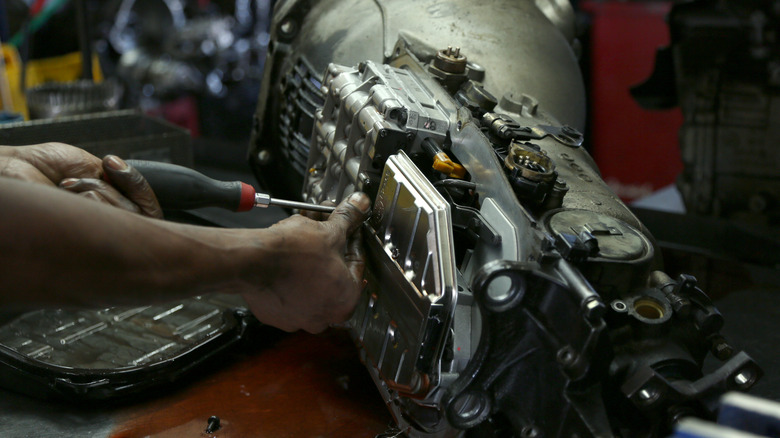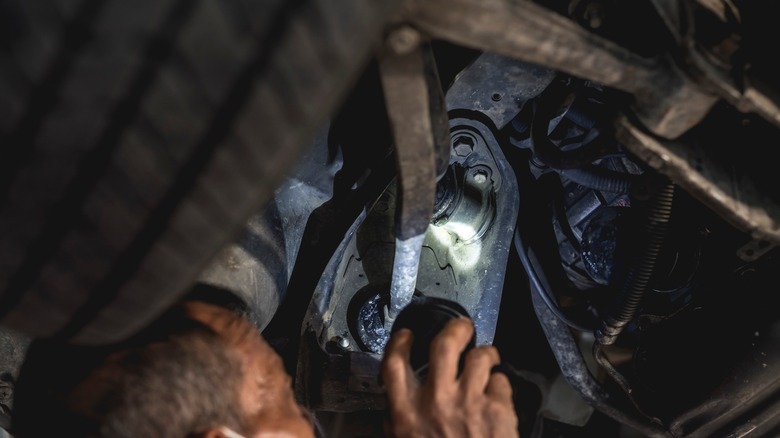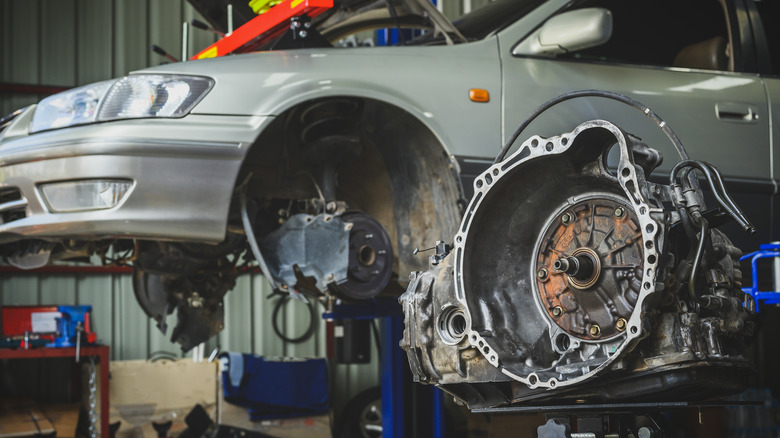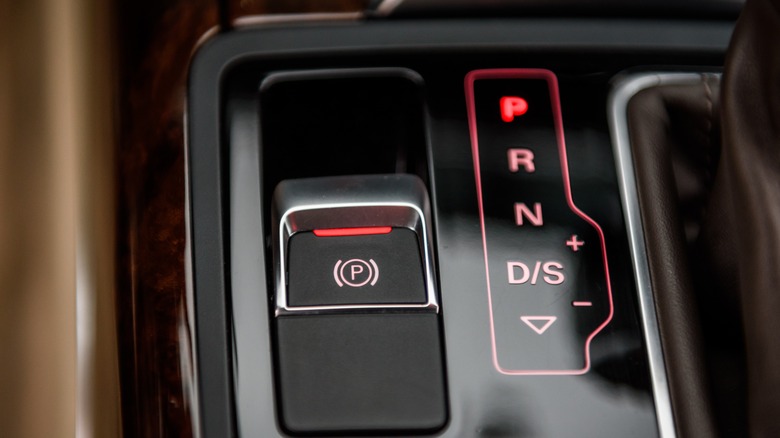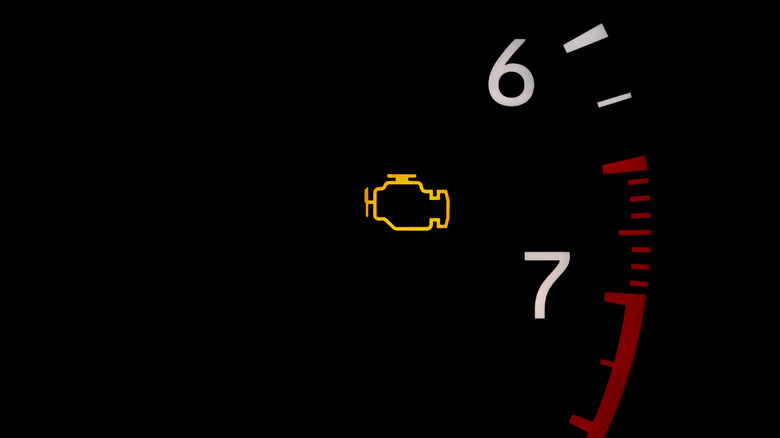5 Signs That Your Car's Automatic Transmission Might Need To Be Repaired/Rebuilt
A vehicle's transmission is pretty robust, and when properly maintained, it can last more than 300,000 miles — which is longer than the car or truck itself will last in many cases. However, despite its durability, things can still go wrong with this vital component. Transmissions rarely fail out of nowhere, and you're likely to notice signs something is amiss before the gearbox gives out. Spotting these signs early may mean a simple repair can solve the problem — though there are times when the transmission will need a total rebuild. Things to watch out for include several feelings, smells, leaks, and sounds.
While your transmission being toast is never good news and will likely result in a very expensive fix, it isn't a worst-case scenario. An actual worst-case scenario is what happens when people drive a car with a shot gearbox. A transmission failing entirely is likely to cause catastrophic problems that will leave you stranded by the roadside and may result in you replacing more than your vehicle's automatic gearbox. For that reason, if you notice any of these warning signs, you should take your vehicle to a garage as soon as you possibly can.
You can smell something burning
A burning smell is rarely a good sign, especially when it's coming from your vehicle. The smell could indicate a few things. On the lighter end, it could indicate a problem with your vehicle's air conditioning or a slightly more serious issue like a problem with the fan belt or overheating brakes. Then there are serious problems. If faulty wiring is causing the burning smell, your car may combust. If burning engine oil is the cause of the smell, your engine may have some major issues. Your transmission could also be the culprit. If the burning smell is coming from your transmission, it's likely caused by an overheating problem.
When a gearbox overheats, it can burn the transmission fluid within it. That fluid is there to keep what is essentially a box full of rapidly moving parts well-lubricated. It can't do that if it's boiling and burning. Running an unlubricated, or poorly lubricated, transmission is a guaranteed way to destroy it very quickly. Avoid driving your car until the problem is solved, and harbor some hope that no real damage has been done so far. You may get lucky, and it could be an easy fix, but attempting to use your vehicle when the transmission is overheating will just lead to more severe, and expensive, problems.
Fluid is leaking out
While it may not be as alarming as a burning smell, a pool of fluid below your car isn't a particularly nice thing to encounter either. Your vehicle has a lot of fluid in its various systems, and leaks vary in how serious they are. You'll know if the leak is transmission fluid because of its red coloring, greasy feel, and sweet smell. With that being said, the leak not being transmission fluid isn't usually good news. Oil or coolant leaking out may be indicative of a severe and expensive problem. A brake fluid leak isn't the most expensive thing in the world, but your car won't be safe to drive until it is fixed. A leak in the power steering system is probably good news when compared to the alternatives.
If fluid is leaking from the transmission, that means there is less fluid in the transmission and its contents may not be properly lubricated and cooled. A transmission lacking in lubrication is very likely to damage itself. However, if the leak is minor and caught early, you're probably okay driving the vehicle straight to the mechanic and it's probably a relatively cheap and easy fix. At the other end of the spectrum, if the fluid leaking from the transmission is dark brown or black and smells burnt, you have an overheating issue and the transmission is likely to be damaged. If there's a moderate to severe leak, but the vehicle hasn't been driven — there's a good chance the transmission is fine. Just have it looked over, have the cause of the leak repaired, and have the fluid topped up before you drive the vehicle again.
A grinding noise or other odd sounds
Alongside leaks and smells, sounds are also a good indicator that something is very wrong with your car. While a few different failing components can make a grinding sound, if that sound is coming from the transmission then there's likely a major problem that needs to be fixed. If you hear grinding, the gearbox is already damaged and the sound is a result of further damage being caused. A clunking sound may be easier to link to the gearbox, as it will likely happen as the car shifts between gears.
Again, this isn't a sound you want to hear as it indicates a major problem with your transmission. Your transmission really shouldn't make any noticeable noise, so if you hear any kind of strange sound from it while driving, then it's something you should investigate as soon as you can. Odd noises may also occur when you put the vehicle in neutral. At best, noises when in neutral may indicate you need to change your transmission fluid. However, they can also be indicative of worn bearings, damaged gear teeth, or an issue with the transmission's idler gear.
The transmission is struggling to change gears
A good sign that a transmission is failing involves that transmission no longer being able to do its job properly. If your gearbox is struggling to change gears, then that's a good indication that something is very wrong with it. If shifting into one particular gear is the problem, then the gearbox may need a partial rebuild. However, other signs of struggle may indicate a bigger problem that requires either a full rebuild or a gearbox replacement.
Signs to watch out for include the vehicle revving hard before switching gears, slipping out of gear or between gears often, and hard or rough shifting. Any kind of violent shaking coming from the transmission can also indicate something is majorly wrong. While it's likely to be an expensive fix, a gearbox displaying these symptoms may be very close to failure. As a result, continuing to drive the vehicle is probably not a good idea. While owning a car with a dying gearbox isn't great, waiting by the roadside for a tow truck because you own a car with a dead transmission is worse.
You spot a warning light on the dashboard
While it may seem obvious, warning lights on the dashboard usually indicate a problem with the vehicle. They vary in seriousness with amber or orange lights indicating there's an issue you should get resolved soon and red lights meaning you should get the vehicle off the road immediately and call a tow truck. There is a transmission warning light, which indicates your automatic transmission is having trouble. The light looks like a cog with an exclamation mark inside it. The light will come on if one of the vehicle's many sensors detects what could be a transmission problem.
If you spot this light it's probably a good idea to get to a mechanic as soon as possible. The mechanic will diagnose and fix whatever problem is causing the light to come on. You can also have a crack at it yourself if you have an OBD reader. Some vehicles may not have a check transmission light, but will still alert you if a problem is detected. In this case, the check engine light will more than likely come on. Again, this isn't something you should ignore. Diagnosing and dealing with these issues early can save you from having to fork out for a major repair in the near future.
